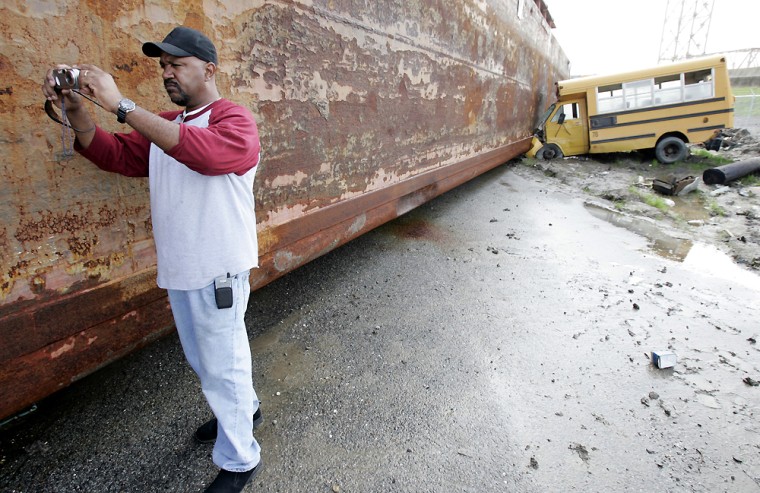Kenneth Morris is a no-nonsense kind of guy. He stood in front of his home in New Orleans' mostly African American Ninth Ward and made this simple assessment: "Until I find out what the powers that be may be going to do, there's nothing I can do."
Morris, like so many other homeowners here, travels back and forth from Mississippi to check on his property. He says his life is on hold. And the longer things drag on here, he says, he's more inclined to pack it all in and leave the city he loves behind.
"Right now the people in power... they just letting a rudderless ship roll on down the road," Morris says.
Population at risk
A recent study by a demographer at Brown University says the city may lose as much as 80 percent of its black residents, including Morris.
The study found that in the most severely damaged areas of the city, 75 percent of the residents were black, and 29 percent were poor. These are areas where rebuilding is stalled, notes the study's author, John R. Logan.
"What I'm saying is that 80 percent of the black population lived in neighborhoods that were flooded, and if the policy becomes not to rebuild in those neighborhoods, that's the population that's at risk," Logan says.
Race is an extremely sensitive issue in this city, which has had a black majority for a very long time.
Race issue
The question of race is never far away, from the images of mostly black and poor residents struggling when Katrina hit, to questions of whether the rescue efforts were slower because the victims were mostly minorities, to questions of which neighborhoods to rebuild, and who will return.
It's an issue with huge potential political consequences as the city struggles to elect a new mayor in April. New Orleans has had black mayors since 1978.
Just about everyone here agrees that New Orleans will be small in the near future. The question is how many African Americans will be here.
"Right now, a person has a better chance of re-establishing their life somewhere else than coming back here, " City Council President Oliver Thomas, who's black, said as he gave a tour of a once predominately African American neighborhood that's now devastated and deserted.
He fears the 80 percent scenario could come true given the way things are going. "Oh absolutely, it's extremely possible," he lamented, "if we're not strategic in rebuilding a lot of those communities and make sure we're offering them real opportunity."
Drive around New Orleans, and that doesn't seem to be happening. No one has conducted a census count, but it appears more white residents are returning than black. And not surprisingly, more rich than poor.
What's even more troubling to many residents is a local proposal to delay rebuilding in the city's hardest-hit neighborhoods for at least four months, and not until or unless the neighborhoods prove themselves viable.
It's criticism of that idea that led Mayor Ray Nagin to promise a largely African American audience that New Orleans would remain a "chocolate city." Nagin has since apologized for the remark, seen by many as divisive.
Rich roots hope to return
There is another view of black New Orleans. Will Frey, a demographer at the Brookings Institution, points out the black community's roots in the city.
Nine out of 10 African Americans living in the city before Katrina were born in the state, with several generations dating to the Civil War, and the slave era. "In contrast to a lot of other cities like maybe Atlanta, or Miami, or San Francisco, or Los Angeles," said Frey.
People like Wanda Riley, who showed us her home. Everything ruined. Mold still growing. She's fighting her insurance company for a better settlement, and determined to move back home.
"Everybody on this block is a homeowner," she said gesturing down a street that looked like a hurricane had hit yesterday. "We all coming back."
